And Tango Makes Three:
Justin Richardson and Peter Parnell
on Florida’s “Don’t Say Gay” Bill (and More)
 April 26th, 2022 by jules
April 26th, 2022 by jules
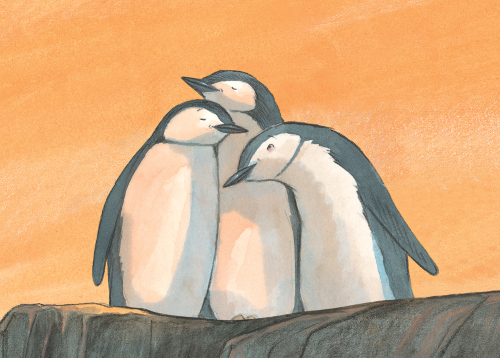
It’s been 17 years since the publication of Justin Richardson and Peter Parnell’s And Tango Makes Three, illustrated by Henry Cole. It tells the warmhearted true story of two male Emperor Penguins, Roy and Silo, at the Central Park Zoo. The two pair-bond, build a nest, and eventually hatch an egg (thanks to help from a zookeeper). Since its publication, this picture book has been one of the most challenged books in America. (Listing all its many challenges would find me slumped over my keyboard into my old age, so I’ll just send you here at Tango’s Wikipedia entry if you’re so inclined to read about the frequent challenges to the book.)
Justin and Peter have had well over a decade to acclimate to book challenges but have some thoughts about Florida’s House Bill 1557, otherwise known as the “Don’t Say Gay” bill, even putting some of those thoughts into this Washington Post piece, addressed to K-3 teachers of Florida. (My favorite thing of 2022 thus far is when they write: “Probably best to give a wide berth to all books featuring gendered heavy machinery, at least until we can figure out what’s what.”)
Justin and Peter join me today to talk about Florida’s new law — and much more. I thank them for their time!
Jules: You wrote this book 17 years ago. What has it been like all these years to hear repeated stories about its many challenges and bans across the country? Did you have any sense that this would happen?
Justin and Peter: We did anticipate that there would be some resistance to the book when we wrote it. But we could never have imagined then the extent of the challenges it would face or the strength of the support it would get around the world. It’s kind of astonishing to think that we’ve found ourselves defending the book on BBC World News against the Singapore government’s plan to pulp it or watching, 17 years after its publication, the state of Florida rule that it can not be discussed in schools. That we did not predict. At the same time, it’s been a great joy to see the way Tango has been embraced by children and their families all over.
Jules: Can you take me back to the first time you learned the book was challenged or banned in a school?
.jpg) Justin [pictured left] and Peter: I think you never forget the first challenge. For us, that was in Missouri, when a library director who had received complaints moved our book from the fiction to the (less browsed) nonfiction section in order not to “blindside” parents. The story got picked up by the AP (much thanks to a local news reporter who read the library’s log, looking for stories). We heard about it on a Saturday night and were, like, “Okay, this is happening.” The story traveled around the world. Stephen Colbert held up the book on The Colbert Report and proclaimed it the Number Two Threat to the American Way of Life (the number one threat was people who are not blond).
Justin [pictured left] and Peter: I think you never forget the first challenge. For us, that was in Missouri, when a library director who had received complaints moved our book from the fiction to the (less browsed) nonfiction section in order not to “blindside” parents. The story got picked up by the AP (much thanks to a local news reporter who read the library’s log, looking for stories). We heard about it on a Saturday night and were, like, “Okay, this is happening.” The story traveled around the world. Stephen Colbert held up the book on The Colbert Report and proclaimed it the Number Two Threat to the American Way of Life (the number one threat was people who are not blond).
Jules: Some authors see a banned or challenged book as a kind of badge of honor, though in a recent interview with Stephen Colbert (speaking of!), author Jason Reynolds talked about why that’s not the case for him. How do you two feel about that?
.jpg) Justin and Peter [pictured right]: We have a coffee mug at home that we stumbled across in a toy store with our daughter a few years ago. On it are displayed a dozen or so banned book titles. There’s Animal Farm, 1984, and On the Origin of Species. And our title is snuggled in there amongst the rest of them. We thought the juxtaposition of our book with these great works was kind of hilarious.
Justin and Peter [pictured right]: We have a coffee mug at home that we stumbled across in a toy store with our daughter a few years ago. On it are displayed a dozen or so banned book titles. There’s Animal Farm, 1984, and On the Origin of Species. And our title is snuggled in there amongst the rest of them. We thought the juxtaposition of our book with these great works was kind of hilarious.
But we’d by lying if we said we weren’t also proud. In the years that we read Tango aloud at the ALA’s Banned Books Week Read-out in Chicago, we did so alongside folks like Steven Chbosky, Robie Harris, and Judy Blume. It’s an honor to be in such great company. But in truth, being banned is painful and infuriating. Any pleasure one can squeeze out of it is worth holding onto, if it softens the blow.
Jules: Florida’s “Don’t Say Gay” bill is obviously harmful in many ways. What do you suggest concerned citizens do to protest the law? What do you think are the most important steps for community members to take?
Justin and Peter: Having mentioned Singapore puts us in mind of one of the most powerful grassroots interventions we have ever seen to protect our book and others. When the government there announced they would remove and destroy every copy in every one of their libraries, a large group of parents staged a read-in. They brought their children in their pajamas to the steps of the national library and cuddled up with them, reading them our book and others. And they had it filmed for the news. The government relented. These types of local interventions by concerned citizens can be quite effective. The law will also, hopefully, face legal challenges of various sorts. Supporting the organizations that may bring those challenges is also crucial.
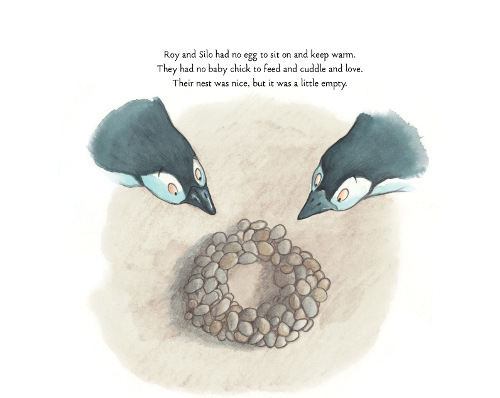
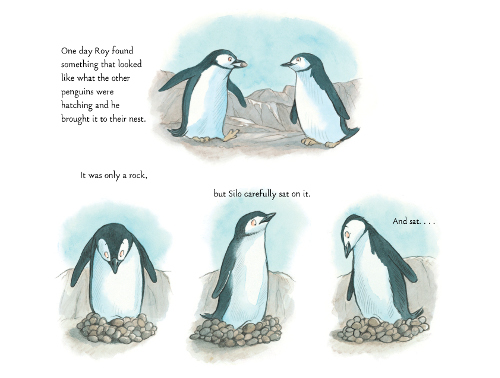
Jules: How do you respond to the many instances across this country of adults attempting to remove books about race, sexuality, and gender from classroom and library bookshelves? It feels like a kind of hysteria at this point, I must say.
Peter: Peter here. I think the idea that by teaching a child about something you will make that person become the thing itself is a hysterical reaction — in this case stemming from a decades-old fear about sexuality and sex itself. Parents want to protect their children from what they themselves fear or disapprove of. This may be valid when it comes to violence and hurting other people, but not when it comes to ideas and not when it comes to feelings, including love. We’ve read our book to many K-3 students all around the country over the years. Young kids understand that Roy and Silo want to make a family together. They don’t think about penguins — or people — having sex. They think about them loving and protecting each other and raising a chick or child.
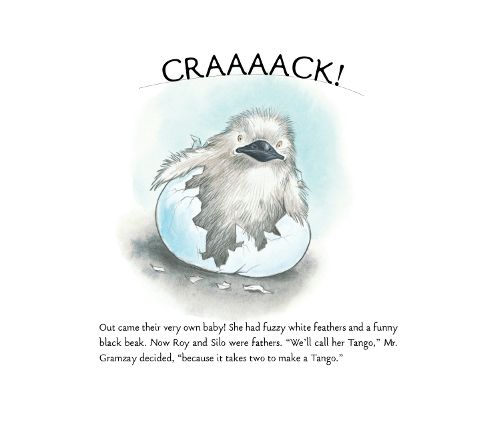
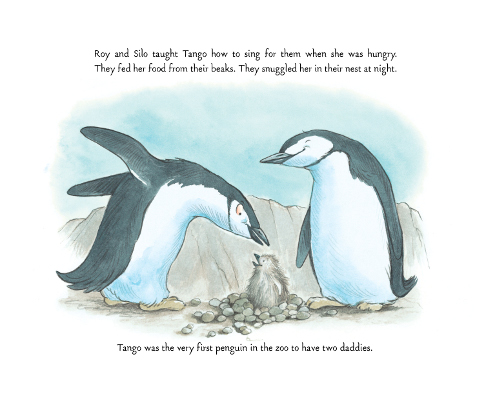
Jules: This question (as all are) is for both of you. But, Justin, this must be particularly distressing and/or galling to you, given your work as a psychiatrist and as someone who consults adults on talking to children about sexual development.
Justin: The book actually grew out of my experience as co-author of a book about the very real challenges parents face when their kids and sexuality appear in the same sentence — Everything You Never Wanted Your Kids To Know about Sex (But Were Afraid They’d Ask) [published in 2003 and cowritten with Mark Schuster]. As Peter said, it’s so important to help parents understand what language and what topics are actually “age-appropriate.” Explaining that sometimes two people of the same sex form a couple and make a family is appropriate at any age. Full stop.
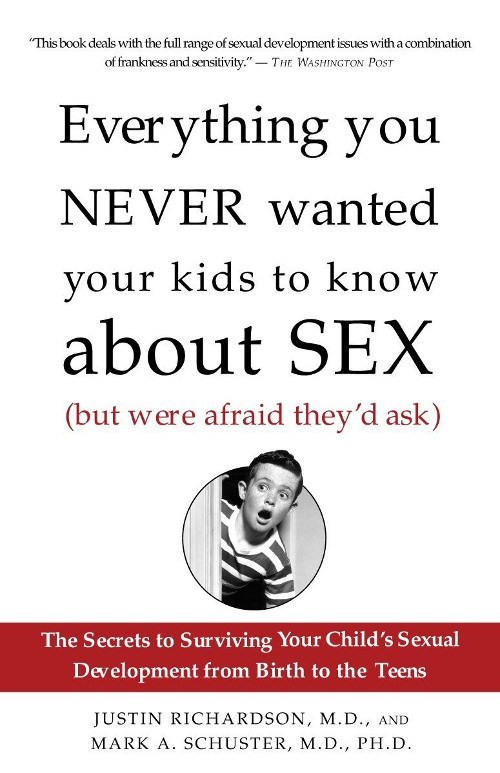
Jules: Why do you think these culture wars over such books are happening now?
Justin and Peter: The challenges we are seeing now are quite different from those years ago when one family would feel a book that supports two (penguin) dad families is not in keeping with their values. Now we are largely seeing Republican politicians’ rather cynical exploitation of parents’ fears and prejudices to advance their own careers. This is the sad state of our politics today.
Jules: What do you say to adults who talk about the need to “protect” child readers from what they call disturbing or uncomfortable stories?
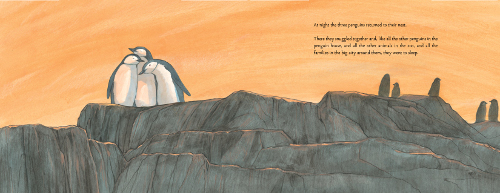
and all the families in the bity city around them, they went to sleep.”
(Click spread to enlarge)
Justin and Peter: Of course, it’s important to be attuned to one’s own child and to anticipate what sort of material they might find frightening or disturbing. That’s certainly something we think about whenever we select a book for our daughter. That said, most of the rhetoric challenging books, such as books that address racism in America, may use the language of concern and protection for children’s sensitivities but are inspired by the political agendas of adults — not an understanding of a child’s mind.
Jules: How do you think children’s literature has evolved for the good in the past 17 years?
Justin and Peter: One of the advances we have noticed more and more often is the inclusion of LGBTQIA+ characters in fiction that isn’t specifically about their lives. Another is the publication of queer stories of a great diversity of characters than we saw in the decades before. Some titles that jump to mind are You Should See Me in a Crown by Leah Johnson, Last Night at the Telegraph Club by Malinda Lo, and The Magic Fish by Trung Le Nguyen.
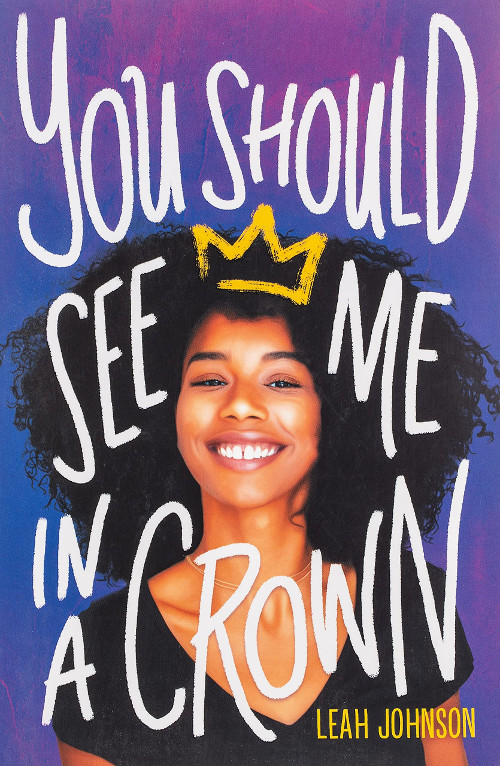
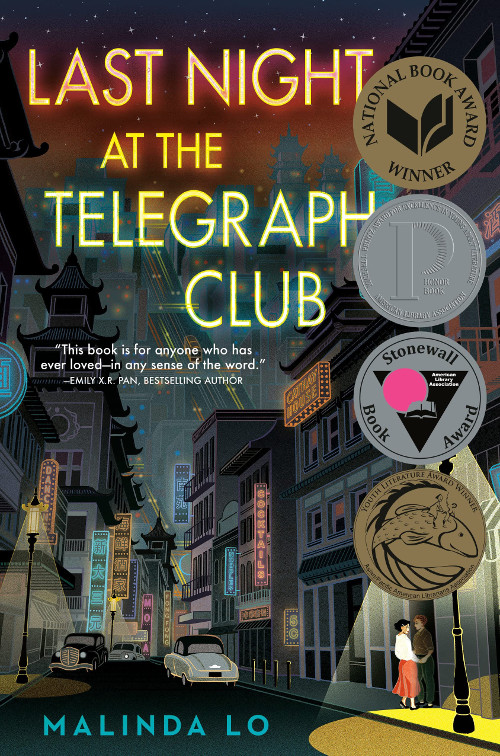
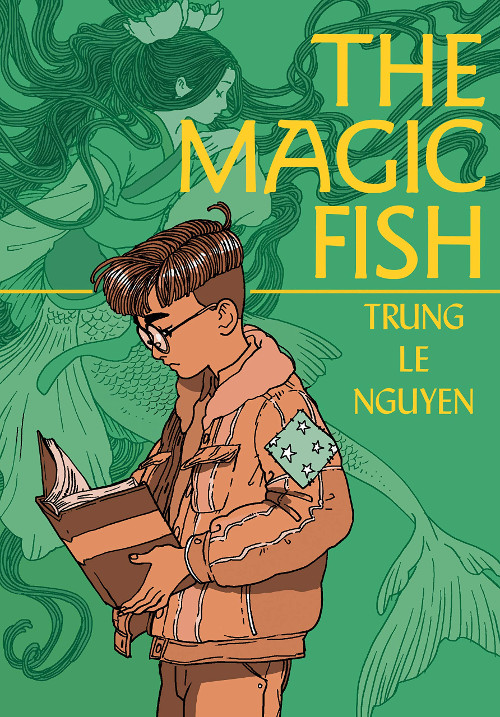
Jules: How did you first learn of Roy and Silo’s story?
Peter: Justin and I were sitting at the kitchen table, reading the New York Times on a Saturday morning in February 2004. Justin read aloud an article called “The Love That Dare Not Squeak Its Name”, which was about these two male penguins at the Central Park Zoo who pair-bonded and tried to hatch a rock. There was something about Justin reading the story aloud that made us think, this sounds like a children’s book. Justin, who is always more of an optimist than I am, said, “Let’s write it today!” We both sat down and wrote our versions of the story. Mine was more tongue-in-cheek: Roy and Silo were more literally like two New York gay men (“Roy loved Sondheim. Silo enjoyed Jerry Herman.”) Justin’s was the right approach. Then we set to actually writing and rewriting the book, sharpening it, pairing it down, suggesting how to space the story out over 32 pages. We sent the first draft to Justin’s book agent fairly soon after that to see if there was any interest in an editor working with us. David Gale at Simon & Shuster was the perfect person to work on it with.
Jules: Has it been immensely rewarding to you two to see your book embraced by children for the past nearly 20 years? It is evergreen, no doubt.
Justin and Peter: The satisfaction is deep and heartfelt. It has been one of our most fruitful collaborations.
Jules: Do you think you’ll ever collaborate on another book together?
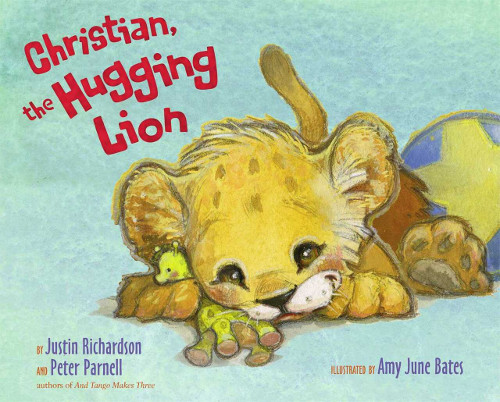
Justin and Peter: We did do a second book together, called Christian, the Hugging Lion [illustrated by Amy June Bates], also based on a true story. It is about two Englishmen who bought a baby lion cub at Harrods, raised it in the Kings Road area of London in the 1960s, and then flew to Africa and released it to create a family of its own.
As for a third book? We don’t know. We have collaborated with each other on each other’s lives. And on our daughter’s. That has been our greatest collaboration of all.

AND TANGO MAKES THREE. Text copyright © 2005 by Justin Richardson and Peter Parnell. Illustrations copyright © 2005 by Henry Cole and reproduced by permission of the publisher, Simon & Schuster Books for Young Reader, New York.
Photo of Justin Richardson taken by Peter Parnell.
Photo of Peter Parnell taken by Justin Richardson.
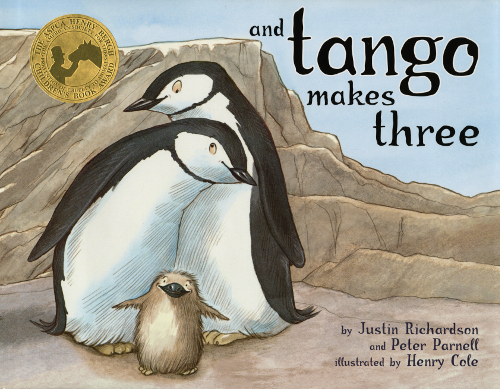

Opened the above by chance and there was Peter! Please convey my appreciation for his work and my invitation to host him and Justin next time they may be in Athens